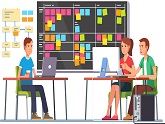How can you determine if your system can deliver what has been promised? There may be contractual obligations you must meet relating to cost, throughput, or staffing requirements. How can you be confident that you can meet cost expectations as proposed? Can your system meet throughput requirements with the proposed changes to product flow? Do resources supplied by vendors perform as expected? If you increase customer demand, how does this impact your staffing requirements?
How to Handle Complex Queueing Environments at the Airport
As anyone who’s been to an airport recently can attest, queueing is part of the experience. We queue to get through security, we line up to order food or drinks, and last we wait our turn to board the aircraft. Most simulation models revolve around contention for resources or constraints with limited capacity, and the modern flying experience has its fair share of contention.
Topics: Tips & Tricks
Arena simulation software provides standard template panels for general purpose simulation models such as basic process, advanced process and advanced transfer. These panels contain reusable modeling elements called modules. These modules are the building blocks of your simulation model and have generic names like Process, Convey, and Record. But what if you need something more specific? What if you need passengers instead of entities, or doctors instead of resources? Arena allows you to develop custom templates to address your need. In fact, Arena includes a custom template panel - “Packaging” - for modeling high speed processes.
In Lean manufacturing, one common technique is to sort jobs based on their expected processing time and then to run the shortest ones first. To do this in Arena, there needs to be an attribute on which to sort the queue. For processing jobs where the processing time will be known, the time can be written to the attribute and then used for both the sorting and the processing.
Topics: Tips & Tricks
Having implemented several Lean & 5S projects, I have had the opportunity to see first-hand the transformative effect visual information has in an organization. When people can understand what is going on without having to dig and ask questions, they become engaged in the process. Communicating information throughout all departments and levels of an organization is critical for implementing and sustaining lean manufacturing initiatives. Visual systems can go in a long way to help reinforce the behaviors that you are trying to instill in the employees. Through visual management, employees gain an understanding and therefore can engage in the problem solving easier.
A mine and its associated ore processing plant are typical environments where simulation provides important benefits. Simulation is used in these plants to address many important business considerations:
Topics: Logistics, Tips & Tricks, Mining
Every mine has an extraction plan, and the simulation will be more precise considering it. Basically, the plan has information regarding the material available on each extraction point, and the sequence it will be extracted.
Topics: Logistics, Mining, Port & Terminal, Supply Chain
Arena v15 is a native 64-bit product. Which means that Arena utilizes significantly more memory than the 2 GB limit of 32-bit software. 64-bit applications can utilize up to 8 Tb of memory!
Topics: Features, Tips & Tricks
More Accurately Model Demand with New Adjustable Batch Module
To meet demand or satisfy schedules it may be necessary to create a partial batch in your model. With Arena v15's new Adjustable Batch module you can easily create a partial batch or group of entities. The adjustable batch may be based on time or a signal. This video demonstrates how you would create a partial batch if the Maximum waiting time has been met.
Topics: Tips & Tricks
5 Things We Wished We Learned in Engineering School
Youth is wasted on the young.
In general the older we become the more we tend to agree with this statement. At one point however we were in that position. Young engineers full of ambition and excitement, ready to take on the world. Maybe you had a co-op or internship during school but the experience that you gain in the first few years of your new job is invaluable.
I want to have some fun and pretend that we could give that younger version of our self some advice - A few short lessons moving forward in hopes of getting things right the first time.
Here is what came to mind when I thought of sitting down with a young Chris, let’s see if you agree.
1. Become very comfortable speaking with and to others
There are multiple arenas where rhetoric is key such as meetings, presentations, and informal conversations. People will decide, fair or not, your ability to do other things based on your words. So what tangible things can you do to be better at this?
- Practice: Go to many events professional or otherwise and talk to people. Afterwards ask them for feedback on your rhetoric. They may be surprised by this request but their responses are key for becoming self-aware of habits such as looking away, saying um, etc. If you’re really serious join a Toastmasters club and get professional guidance in an environment free of consequences.
- Do your due diligence: One of the easiest ways to combat any issues of nerves is to simply be more confident on the topic being discussed. The more prepared you are the less you will have to think on the fly.
2. Keep it simple, keep it visual
One thing to be cautious of is doing too much. While you have good intentions, working on your first few projects you may have an urge to use every tool and technique you ever learned on it. The second piece of the project is presenting what you have done. The big difference here is that there isn’t a professor checking your work against an answer sheet. The right answer is one thing, making sure others understand that answer is another. So what should you be aware of to be in control of these two elements?
- Let the work choose your method: Don’t get into the habit of using everything in the book or only the methods that you feel most comfortable with. Let the nature of the work you are doing determine what best fits the problem. A large project that requires forecasting, Gage R&R, and sensitivity analysis may demand that you need to create a simulation to test multiple scenarios before changing the physical model. On the other hand if the work only requires some ballpark numbers on monthly production a couple hand written or excel calculations may suffice.
- Add visuals to help transform information into knowledge: One of the biggest differences between school and work is that in school when you get X=16.8 if that is what is in the book you’re right and if not you’re wrong. In your work however the right answers may not be explained well and so no action is taken or worse the wrong action is taken because of someone’s silver tongue. Being data driven is important but visual displays can help bridge the gap to management decision making, especially when your management does not have a technical background. If you are hoping to change a step in a process then display a map of the entire process so that you can show where rework would be eliminated or time would be saved. There are visuals for every type of need (comparisons, timeframe, etc.). A great resource to learn more on the various structures is “The Napkin Sketch Workbook.”
3. Emails aren’t just emails anymore
The purpose of emails in school may have just been to get notifications or send a file to yourself but not now. Emails are how you find out what work you have to do and it’s sometimes used in replacement of in person meetings. So again, how should you handle this?
- Have a professional tone in all of your emails. Even if it is a friend, when at work you are always a professional.
- If the conversation isn’t simple enough to resolve in a few messages suggest to the participants to have a short in-person or online meeting to more effectively reach a solution
- Read your emails before you send them. If you were the recipient would it make sense to you; did you give too little information, too much?
- Read through the entire email chain conversation before responding, critical pieces for you to know could be in any one of the responses of the chain.
4. If you don’t use it you lose it
You’ve been in school learning every year since you were about 4. Doing so has not only helped you learn more but it has kept you sharp. Something not always realized though is that once you enter the workforce you may not necessarily be learning anymore. Of course you learn the ways of your company but it is more of an orientation than a degree program. So how can you ensure you don’t fall into the trap of only remembering how to do things a particular department of a particular company needs?
- Study the old: Everyone knows that if you don’t continuously do something you become worse at it, and that’s not to mention the importance of deliberate practice. You may not care to relearn French or get your jump shot back but how about the principles from your O-Chem class, or fluids, or circuits, or data mining? Something you once knew well enough to pass a test could be making your life easier in the real world right now.
- Study the new: Why should you stop learning now, the world is not static. Stay sharp by being active in your professional societies. Keep growing yourself by self-studying reading books & articles. Expand your abilities even and consider going back for that graduate or other advanced degree. Learning never ends.
5. The sun will rise tomorrow
The flip side to being young and excited is that every event can seem like the be-all end-all. If a supervisor is not happy with your work it may feel that you’ve let down the company and are sure to be fired. On the other hand if that supervisor is happy with your work you might expect for maintenance to be setting you up in the corner office next week. Both these situations are not healthy responses, especially in the long run. Staying level headed will keep you ready for what comes next and show others your maturity. How do you stay balanced though?
- Get feedback on what did or didn’t go well: A good supervisor will give you constructive criticism but if not, don’t be afraid to ask why they aren’t happy with your work and what you could have done better. On the flipside when they are happy with your work, ask to make sure you understand why that is. Feedback is always a good thing.
- Take time to evaluate where you are and where you want to be: In some companies they would love for you to become comfortable with your current role and stay in it for years. Others may have visions of you moving up the ladder and doing more. Either way it is important to decide if you’re happy with what you are doing. Nothing has to be set in stone and you can always get closer to your goals. If you’re not as happy as you should be think about why that is and what things you should be doing to change that. Likewise, if you enjoy being where you are it may still be beneficial to understand the forces in play that can keep you there.
I’m sure there are many more lessons than these that you would tell your own younger self, everyone has their own understanding of what they need. With that said I’d be interested to hear your thoughts – feedback is key - so send me a message and let me know what you would say, what you liked about the lessons I picked, and what you didn’t. While it may have been later on in life that we learned these lessons ourselves there’s no reason we can’t be a mentor and give some of that sage advice now. Youth may not have to be wasted after all.













